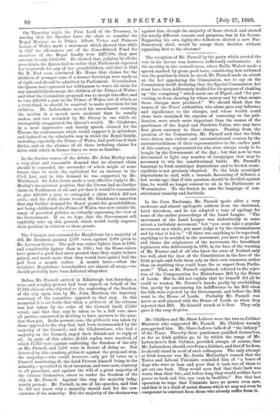The reception of Mr. Parnell by the party which carried
the vote in his favour was, however, sufficiently enthusiastic. At
the meeting in the council-room, where Bailie Walcot made a speech marked by great good taste, considering how awkward was the position in which he stood, Mr. Parnell made an attack on the Act appointing the Commission, not to say on the Commission itself, declaring that the Special Commission Act must have been deliberately drafted for the purpose of cloaking up "the conspiracy" which made use of Pigott, and "for pre- venting us from showing by whose money and by what means. those charges were produced." We should think that the names of the Times' authorities, who alone gave any influence and significance to the charges, and whose wealth could alone have sustained the expense of venturing on the pub- lication, were much more important than the names of the gentlemen of the Loyal and Patriotic Union, who may have first given currency to these charges. Passing from the question of the Commission, Mr. Parnell said that the Irish were driven into violent and unconstitutional courses by the untrustworthiness of their representatives in the earlier part of this century, representatives who were always ready to be bought by the Government of the day ; but that now he was determined to fight any number of campaigns that may be necessary to win the constitutional battle. Mr. Parnell's language to Irish municipal deputations and to Scotch muni- cipalities is not precisely identical. To the Irish municipal deputations he said, with a bravado flavouring of defiance, a few weeks ago, that if this question should be decided against him, he would no longer consent to sit in the Parliament at Westminster. To the Scotch he uses the language of con- stitutional tenacity and fortitude.


































 Previous page
Previous page